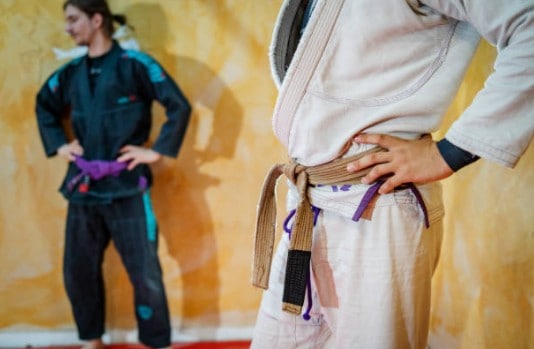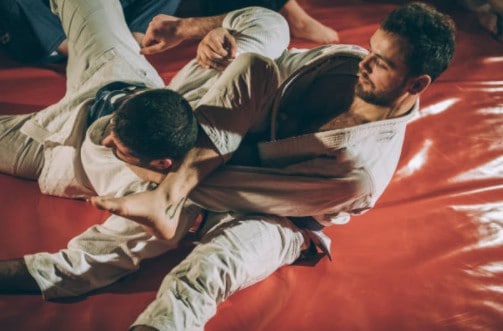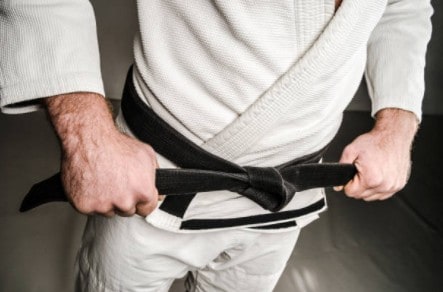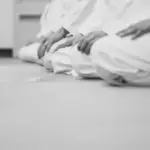There are many reasons why people quit Jiu-Jitsu. Ask any student or instructor at your BJJ gym if they’ve felt like quitting. All of them will tell you there were moments where they wanted to quit. The reason why they are still there is that they enjoy practicing and learning Jiu-Jitsu.
The 10 most common reasons why people quit Jiu-Jitsu are:
- Injuries
- Cost
- Lack of structure in the curriculum
- Comparing themselves to the progression of others
- Not as fun or exciting as it used to be
- Time commitment
- Rolling is too intense for the skill level/ goals of the student
- Discouraging when hitting plateaus
- Burnout
- BJJ isn’t for everyone
Why Do Injuries Cause People To Quit BJJ?
Injuries in BJJ can cause someone to completely stop training for the following reasons:
- Does not want to risk re-injuring themselves.
- Feel as though they fell behind during the time off to recover.
- Taking time off to recover broke the habit of going to class.
- The injury they received was too severe to continue training.
Past injuries can prevent people from continuing (or even starting) Jiu-Jitsu because they do not want to re-injure themselves, cause further damage to the problem areas, or don’t believe the injury can be worked around.
When coming back to class off an injury let your rolling partner know what you have injured. Ease back into training and don’t push past pain or try any explosive or sporadic movements.
After you are finished recovering it can be hard to get back to the routine of going to class. And if you did manage to get to class it is easy to feel as though you fell behind your teammates and won’t be able to keep up. Both these reasons can cause people to not go to class as it can be discouraging!
It’s ok that you may not be able to keep up with Taylor in class anymore or that you cannot escape Ashley’s back mount. Why did you start BJJ in the first place? To keep up with Taylor and Ashley? Or, to do the best you can?
Does The Cost Of BJJ Cause People To Quit?
The cost of Brazilian Jiu-Jitsu can cause many BJJ white belts to quit. Most gyms cost $100 – $130 a month which is a large monthly income commitment, especially for a new hobby. The first month of Jiu-Jitsu can cost upwards of $200-$300 when factoring a new Gi into the price!
Check out my article on the cost of Brazilian Jiu-jitsu if you’re more curious about how much it costs.
The cost of BJJ can cause students to quit because there may be a month that you cannot pay for classes which will break your habit of going to class. And, setting aside money to pay for the next month could be hard if your budget is tight or getting tighter.
The same issue can be if your parents cannot pay for your classes any longer. They may not be able to afford the cost of the classes for you to go or replace your gear.
Is There A Lack Of Structure In The Curriculum?
Brazilian Jiu-Jitsu is notorious for having a lack of structure in its curriculum, especially when compared to the education system we grew up in. The lack of structure can be a deterrent for students that thrive off structure and goals.
Learning a sweep in the De La Riva isn’t going to be that useful if you do not know how to enter a De La Riva guard without getting passed. That can be frustrating!

The best way to counter this so you feel motivated to train BJJ is to write down what you have learned. Knowing that sweep from De La Riva is going to be useful one day, furthermore, the fundamentals within that technique could be applied to other techniques that you already know.
Create a journal with sections dedicated to different BJJ positions and write down what you have learned in that position. Write down what submissions you have learned in each position, the defense you can use in each, where you can transition to, or sweeps to advance you to a position you know better.
Comparing Yourself To The Progression Of Others
Comparing yourself to the progression of others is the main reason why people start to feel discouraged, cheated, and demotivated in Jiu-Jitsu. It can suck the fun out of Jiu-Jitsu and can cause individuals to start to over-train (leading to burnout), feel like skipping class, and think BJJ is not for them.
Brazilian Jiu-Jitsu is a team sport but an individual journey. You cannot primarily train BJJ by yourself, which makes it team-oriented. But you cannot progress at the same rate as others.
You may progress or grasp onto certain concepts quicker than some people, while they may catch on to other techniques quicker than you.
I remember starting Jiu-Jitsu 2-3 months before another person joined the gym. We don’t get to roll with each other often as he focuses on MMA. But, when we do, he always destroys me!
He was already rolling like a mid-level blue belt while I was struggling against most blue belts!
Likewise, after a year into training, there was a new group of white belts that joined. After they have trained for 2-3 months, they started catching me and summiting me!
I’ll be honest, it was discouraging and frustrating at times. But, I didn’t join Jiu-Jitsu to get better than other students in the class. I joined Jiu-Jitsu to better myself.
So, when other (newer) students started catching me I started looking at how I could improve my defense and turn the tides around. Which lit a fire in me to keep going and train smarter!
Jiu-Jitsu Is Not As Fun Or Exciting As It Once Was
Training Jiu-Jitsu is like any other hobby or activity. It starts out exciting and something you look forward too and then after some time it gets boring or feels like a chore to do.
This can be caused for several reasons:
- You are training too many times per week and you’re starting to burn out mentally and/or physically.
- You wanted to try a new hobby and BJJ just might not be for you.
- Hitting a plateau can be discouraging and may be causing you to second guess yourself.
- You’re the type of person that starts a bunch of new hobbies and quit at the first sign of resistance.
- Progressing in BJJ is slow or other students are progressing quicker than you.
- You find yourself learning the same techniques each class (if this is you, the devil is in the details, not the technique).
Many of these reasons can cause a person to get bored with Jiu-Jitsu or any hobby. I found the best way to counter this is to have a low-frequency schedule. I commit myself to 2 days of Jiu-Jitsu per-week, Tuesday and Thursday.
No matter how tired, unmotivated, or sore I may be, I go to those classes. I might not roll intensely, I might not do well, but I’m showing up to class. This keeps me in a routine of going to class.
I sometimes train 4-5 times a week for multiple weeks at a time. But, as soon as I feel like Jiu-Jitsu is feeling like a chore, I reduce the number of classes I’m going to. Always sticking to the two days I commit to, even if there is a get together with friends on those days.
What Is The Time Commitment For BJJ?
Training Brazilian Jiu-Jitsu three times a week can take up 3 to 4.5 hours (plus commute time) a week. This is doable for most if it’s your only hobby, but if you have work and family commitments on top of BJJ, time can get tight, especially when factoring in travel time!.
For many, the time commitment Jiu-Jitsu requires at the beginning is ok. But as you train more other life demands may be pulling you away from it, whether that is your wife, kids, work, friends, or other hobbies.
To prevent the time commitment from causing you to quit BJJ here are some things you can do:
- Reduce your training schedule so it fits with other commitments.
- Choose a different class time to train at. Are there morning, afternoon, or night classes that work better?
- Can your kids train at the same gym? Can they train in the adult classes?
- Are you a gym-goer? Can one of your workouts be replaced with BJJ?
- Does your significant other want to try training with you?
If Jiu-Jitsu is a hobby you are serious about there is always a way to find time to train, even if it is once a week.
Rolling Is Too Intense For The Student
Intense rolls can cause students to quit BJJ as the student’s goal may not be to compete or become the best. Many students train BJJ to learn self-defense or use it as an alternative to staying healthy. If the gym’s rolling is too intense it can cause students to leave as the risk of injury is greater or they cannot keep up.
Finding a gym that matches your goals can change the dynamic of training. Finding a gym that matches the intensity level you want to train at can mean the difference between getting discouraged and quitting and finding a community you fit in with and look forward to going to.
Discouraged When Hitting Plateaus
Plateaus are when you reach a state of little or no change after some time.
If you have ever gone to the gym to lift weights you may be familiar with plateaus already. In the first few months of weightlifting, you will notice tremendous muscle gains. But, those gains will not last as your body adapts to the new strain you are putting it through.
That 10-15lb muscle gain that occurred in 3 months is not sustainable. You’ll notice that you’ll have to start changing your workouts, exercises, sets, reps, and frequency just to see some progress. Many new lifters get discouraged here and stop working out because what they were doing isn’t working anymore.
The same can be said about Jiu-Jitsu. In the first few months, you’re learning a lot and learning how to apply it. Maybe that loop choke you learned worked every time against Jimmy. Now after a few months, Jimmy learned how to defend it and it’s not working anymore.
You find that loop choke isn’t working on anyone anymore. After a week or two, you notice that you cannot submit the people you have been, or maybe you cannot escape anyone’s side control anymore.

This is normal as everyone in the class is growing and getting better. Maybe you have developed a few bad habits in the techniques you are using or are using the same techniques too often. It can be discouraging t see your progress slow down like that.
But, this is an opportunity to learn new techniques and accept that you may get submit more. Ask questions about the details of a technique and you’ll notice yourself progress just a little further.
Remember that you cannot expect to get the same progression as you did, in the beginning, every day, week, month, or year. There will be times your progression excels quickly and other times it feels as though it’s going backward.
Don’t get discouraged as this is normal in progression!
Burnout
Burnout can cause many white-belts to drop out of Jiu-Jitsu it leads to missing classes, injury, or lack of motivation to continue training. It can cause us to feel more stressed and frustrated, physically, and mentally exhausted, and lead to reduced performance.
Jiu-Jitsu is a physically and mentally draining sport and burnout can cause us to feel as though progress is not happening for the amount of effort we are putting in which can be frustrating.
Our bodies start to feel destroyed and can get overworked which can cause us to get injured more easily. Bodies need time to recover and if our bodies do not get sufficient recovery it becomes much easier to tear ligaments and tendons, pull or sprain muscles.
Burnout can cause us to experience emotional exhaustion which can make us feel drained, unable to cope, and tired. You’ll notice this outside of Jiu-Jitsu as well as in class.
In my experience, I knew I was getting burnt out when I didn’t have the drive to go to class, and during rolls, in class, I felt like tapping at any sign of adversary.
To avoid burnout create a realistic training schedule. As a new white-belt 3 or more classes might be too much on your body, even if you are a very active person before starting Jiu-Jitsu.
Commit yourself to 2 classes a week and add a 3rd one when you’re feeling good. If you feel as though your body is starting to fatigue and burnout go back to the 2 days you committed to. This way you keep your schedule and allow your body to recover.
BJJ Is Not For Everyone
A lot of white belts quit because BJJ is not for everyone. Jiu-Jitsu is a physically and mentally demanding sport that will test you every class. You’ll find yourself in the bottom getting smothered and crushed, while other times you’ll be struggling to learn and apply new techniques.
This type of activity isn’t for everyone, just like how knitting or mountain biking isn’t for everyone. Those new white-belts that quit had the courage to try something new and demanding as Jiu-Jitsu.
After a day, week, month, or even a year some people just don’t enjoy BJJ enough to want to pay for it and continue going. Sometimes it’s not right for their life at that moment, maybe ever, and that’s ok!
Conclusion
There are many reasons why people quit Jiu-Jitsu. From injuries, time, cost, discouragement, or just not enjoying it, it’s ok.
I used to skateboard every day when I was younger. I haven’t been on my board for 3 years now, I still own one, but I’m not going out of my way to practice or get better at it. Is that bad? Should I feel ashamed? Of course not. Our interests and goals change over time and some things we used to enjoy disappear.
Jiu-jitsu is no different.
But, recognize when you’re quitting something too soon or for the wrong reasons.
Are you quitting Jiu-Jitsu because your cardio isn’t keeping up? Are you quitting because Jonny got his blue belt before you? Did you just have a few weeks of rough classes and don’t feel like going?
Don’t give up when you’re faced with some resistance. Getting through these times is what will make you smile when you progress past that plateau or the injury life threw at you.




